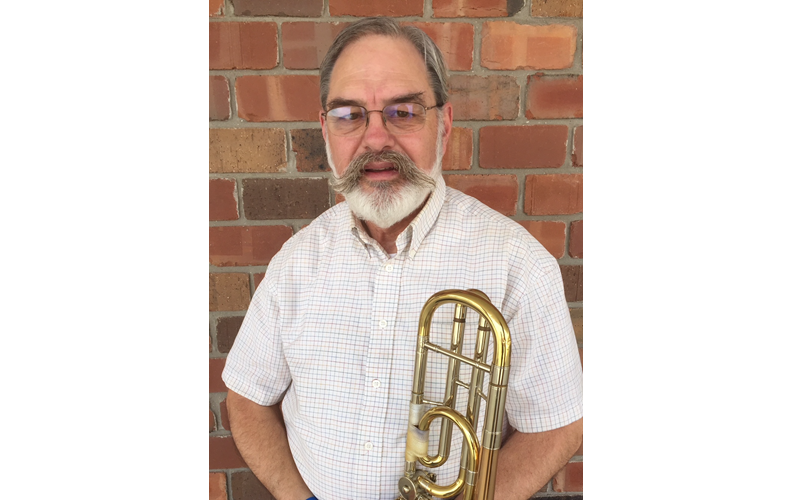A Lifetime of Music, Continued
by Lana Smucker
When he was a child, Dave Cunningham remembers admiring the instruments displayed on the pegboard band room wall, alongside his father, Gordon Cunningham. He remembers entering the fifth grade in Colby, Kansas where he grew up, and playing his first rental trombone.
“I have known since at least the age of 3 that I was going to play a trombone all of my life,” he said.
Music has continued in his life as a member of the Maple City Chamber Orchestra in Goshen. He plays second trombone and has created friendships with the members that sit around him. He has enjoyed his time with MCCO, but his musical journey has come with unexpected circumstances.
Growing up in Kansas, Cunningham found an affinity for music. Accompanying his father, a Vocational Agriculture teacher, in that Colby High School band room, was significant.
“I dearly loved going with my dad to the school and getting to go in and see all the musical instruments,” he said.
He went on to play throughout high school and dreamed of majoring in Trombone Performance at Kansas University where he would later call alma mater.
“Then I began to realize the reality of life on the road, hard on family and what have you,” he said.
After moving to Indiana with his wife to begin a student fellowship group and church, he found his musical ties uprooted in this new place. He played with the Lavender Jazz Band at Goshen College as a guest member, which eventually introduced him to MCCO.
“Back then I wasn’t thinking in those terms, but I look back now and am rather surprised that at age 65 I am still playing,” he said. “But that’s where Maple City Chamber Orchestra comes in and the privilege of having an organization in the community that so strongly supports good music and a place for musicians that love to play. There aren’t very many communities where that opportunity would be available.”
In 2008, he learned that Parkinson’s added another reality in his life. Almost 10 years ago, he can remember some precursor symptoms of the disease.
“I realize that I was wrestling with symptoms and had no idea that’s what it was or what it would lead to,” he said.
Looking back into the 1990s, his musical experiences are markers of the symptoms. After putting down his other instrument, guitar, his family and church members invited him to play for gatherings.
“One year my family went together and got me a Christmas present of a new guitar and that excited me to pick it up again and really start playing,” he said.
He became frustrated when playing on Sunday morning at church. His right arm would lock preventing him from completing strum patterns.
“It was so ridiculous because that’s the easiest thing you can do, is just a simple strumming pattern,” he said.
By the end of the year he had visited his family physician, who noticed a tremor in his hand and eventually a neurologist who diagnosed him with a slowly developing version of Parkinson’s. At 65 years old, he considers that slow diagnosis a blessing, considering what the body engages when controlling an instrument.
“A musician has to coordinate and, use simultaneously, his eyes to see the music, his muscles to operate the instrument, his mental capacity to translate the notes off of the page, into motion to accommodate the instrument, his ears to be constantly tuning the notes he is playing to most effectively mesh with the other musicians in the ensemble,” he said. “It easily encompasses the five senses, plus some more, if you will.”
Now, he plays music with Parkinson’s. He practices guitar to exercise his muscles, which improves with practice and rest periods. He also attends MCCO rehearsal which similarly works his muscles through trombone.
“My neurologist is thrilled that I continued to be involved with music,” he said.
The realities of Parkinson’s and the continued presence of music are important for Cunningham. Today, he continues to practice with MCCO for the concerts to come.

